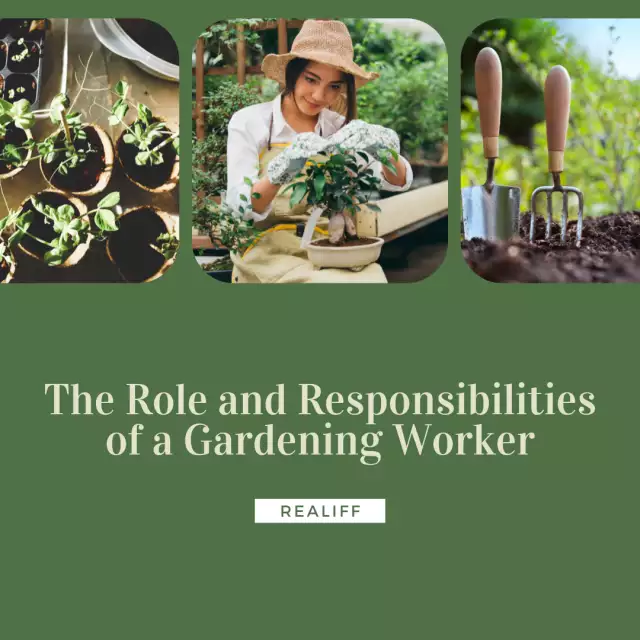The Role and Responsibilities of a Gardening Worker
Gardening workersplay a vital role in nurturing and maintaining the beauty of our outdoor spaces. From lush gardens to well-manicured lawns, these skilled individuals bring life and vibrancy to our surroundings. In this comprehensive article, we will delve into the world of gardening workers, exploring their duties, skills, tools, and the importance of their work in creating and maintaining appealing landscapes.
Who is a Gardening Worker?
A gardening worker, often referred to as a gardener, is an individual responsible for the cultivation, care, and maintenance of plants, flowers, trees, and other elements in outdoor spaces. They are often employed in a variety of settings, including private residences, public parks, botanical gardens, and commercial properties. Gardening workers are essential for creating and preserving aesthetically pleasing and functional outdoor environments.
Duties and Responsibilities
Planting and Propagation:
- Selecting appropriate plants and flowers for the landscape.
- Preparing soil for planting.
- Planting seeds, bulbs, or young plants.
- Propagating plants through cuttings or grafting.
Soil Management:
- Assessing soil quality and composition.
- Amending soil with compost, fertilizers, and other nutrients.
- Ensuring proper drainage and aeration.
Watering and Irrigation:
- Monitoring soil moisture levels.
- Implementing efficient irrigation systems.
- Adjusting watering schedules according to plant needs and weather conditions.
Pruning and Trimming:
- Trimming and shaping trees and shrubs.
- Pruning dead or diseased branches.
- Promoting healthy growth and aesthetics.
Pest and Disease Control:
- Identifying and managing pests and diseases.
- Using organic or chemical treatments when necessary.
- Promoting integrated pest management practices.
Lawn Care:
- Mowing grass to maintain the desired height.
- Seeding and aerating lawns.
- Applying fertilizers and weed control measures.
Landscape Design and Maintenance:
- Collaborating with landscape architects for design projects.
- Installing and maintaining hardscape elements like pathways and fences.
- Seasonal planting and redesign as needed.
Equipment Maintenance:
- Maintaining and servicing gardening tools and equipment.
- Ensuring safety while using power tools like lawnmowers and chainsaws.
Essential Skills and Qualities
Plant Knowledge:
- Familiarity with various plant species, their growth requirements, and maintenance needs.
Physical Stamina:
- Gardening work can be physically demanding, requiring endurance for tasks like digging, lifting, and carrying.
Attention to Detail:
- Precision in pruning, planting, and landscaping is crucial for achieving desired results.
Problem Solving:
- Identifying and addressing plant health issues and pests effectively.
Creativity:
- Designing and implementing attractive landscapes that complement their surroundings.
Communication:
- Collaborating with clients, colleagues, and landscape professionals.
Environmental Awareness:
- Implementing sustainable and eco-friendly gardening practices.
Tools and Equipment
Gardening workers rely on a variety of tools and equipment to perform their tasks efficiently. Some common tools include:
- Hand tools (e.g., shovels, pruners, hoes)
- Power tools (e.g., lawnmowers, chainsaws)
- Irrigation systems (e.g., hoses, sprinklers)
- Soil testing kits
- Safety gear (e.g., gloves, goggles)
Importance of Gardening Workers
Aesthetics:
Gardening workers contribute to the visual appeal of outdoor spaces, enhancing the beauty of homes, parks, and public areas. Their meticulous attention to detail in planting, landscaping, and maintaining greenery transforms ordinary spaces into captivating and inviting environments. Whether it's the vibrant colors of blooming flowers in a garden, the neatly trimmed hedges lining a property, or the well-manicured lawns of a park, gardening workers infuse natural beauty into the surroundings. This aesthetic enhancement not only pleases the eye but also creates a sense of harmony between human-made structures and the natural world, fostering a more pleasant and soothing atmosphere for everyone to enjoy.
Environmental Benefits:
Gardening workers play a vital role in helping to preserve and restore natural ecosystems. By carefully selecting and maintaining plant species, they promote biodiversity by creating habitats for various wildlife, including insects, birds, and small mammals. Additionally, their responsible use of fertilizers, pesticides, and water resources minimizes negative impacts on the environment. Moreover, the plants they nurture contribute to improved air quality by absorbing carbon dioxide and releasing oxygen, while the careful management of soil helps prevent erosion and protect water quality. In essence, gardening workers are stewards of the environment, contributing to the health and sustainability of our ecosystems.
Property Value:
Well-maintained landscapes significantly impact property values and curb appeal. Homes with beautifully landscaped gardens and manicured lawns not only command higher selling prices but also attract potential buyers or renters more quickly. A carefully designed and maintained outdoor space enhances the overall aesthetics of a property, making it more inviting and desirable. Moreover, it can set a positive first impression, influencing a potential buyer's perception of the entire property. For homeowners, a well-kept garden offers a private sanctuary and a place to relax, increasing their enjoyment of their property and contributing to their overall quality of life.
Recreational Spaces:
Public parks and recreational areas benefit immensely from the efforts of gardening workers. These professionals ensure that parks are safe, beautiful, and enjoyable for visitors. They maintain lush green lawns, create colorful flower displays, and provide well-maintained walking paths, making parks conducive to relaxation, exercise, and social gatherings. Public spaces adorned with well-tended gardens also promote community engagement and foster a sense of pride among residents. Whether it's a tranquil urban oasis or a sprawling natural reserve, gardening workers contribute to the creation of recreational spaces that serve as havens of tranquility and leisure for people of all ages.
Food Production:
Gardening workers are not limited to ornamental gardens; they also contribute to food production through vegetable and herb cultivation. By tending to vegetable gardens, they enable the growth of fresh, organic produce, reducing the reliance on mass-produced and potentially less nutritious store-bought alternatives. This practice supports local food production, encourages healthier eating habits, and fosters a deeper connection between individuals and the source of their food. Gardening workers in community gardens and urban farms play a critical role in ensuring that fresh, homegrown fruits and vegetables are accessible to people in their communities, promoting food security and sustainability.
Conclusion
Gardening workers are the unsung heroes behind the lush gardens, vibrant flower beds, and well-kept lawns that grace our surroundings. Their dedication, skills, and passion for nurturing the natural world play a crucial role in creating and maintaining beautiful and sustainable outdoor spaces. Whether in private gardens or public parks, the work of gardening workers enriches our lives and connects us to the beauty of nature.





